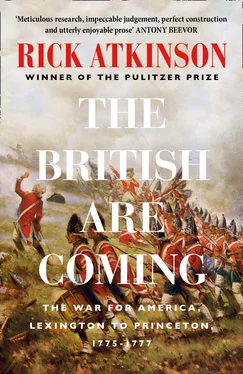The king held firm, of course. For months British newspapers would chronicle the presentation of wounded officers at court, as in this announcement: “Yesterday Captain Cockering, who lost his arm at Bunker’s Hill, was introduced to His Majesty at St. James’s.… His Majesty was pleased to present him with a captain’s commission in a company of invalids.” The king also decided, as Barrington informed Gage, that injury compensation would be paid, retroactive to Lexington. An officer who lost an eye or a limb would receive a year’s pay and medical expenses; the widows of officers killed in action would also get a year’s pay, plus another third for each child. Those who died of their wounds within six months were “deemed slain in battle.” No bonuses were announced for enlisted men.
Another deranged afternoon had come and gone in Massachusetts, and yet that awful Saturday lingered for every man in harm’s way. “Some other mode must be adopted than gaining every little hill at the expense of a thousand Englishmen,” Glanville Evelyn of the King’s Own told his family. Just before midnight on June 17, Evelyn had taken a moment to write his will, philosophically reflecting that those in “the profession of arms hold their lives by a more precarious tenure than any other body of people.”
As Captain Evelyn pondered the future, others tried to forget the past. Reverend David Osgood, a New Hampshire regimental chaplain, would recall as an old man how for the remaining eight years of war after Bunker Hill “a burden lay upon my spirits.… Visions of horror rose in my imagination, and disturbed my rest.” A British officer in the 63rd Regiment of Foot could only agree. “The shocking carnage that day,” Major Francis Bushill Sill wrote in a letter home, “never will be erased out of my mind ’till the day of my death.”
4.
What Shall We Say of Human Nature?
CAMBRIDGE CAMP, JULY–OCTOBER 1775
A sultry overcast thickened above the American encampments on Sunday morning, July 2. By order of General Ward, company officers had begun scrutinizing their troops during daily formation for signs of smallpox. Militiamen marched to prayer services for yet another sermon on the evils of profanity. At General Putnam’s suggestion, they sometimes shouted Amen! loud enough to alarm British sentries.
Even on the Sabbath, British cannons pummeled Roxbury. “The balls came rattling through the houses,” a soldier told his diary. “They neither killed nor wounded any of our men, which seems almost impossible.” The Yankees answered with a pointless spatter of musketry. Heavy rain began to fall at eleven a.m., sharpening the camp odors of green firewood, animal manure, and human waste. Private Samuel Haws updated his journal: “July 1. Nothing remarkable this day. July 2. Ditto.” Private Phineas Ingalls was a bit more descriptive in his Sunday diary entry: “Rained. A new general from Philadelphia.”
Possibly not one of the seventeen thousand soldiers now under his command in Massachusetts knew what George Washington of Virginia looked like. Few Americans did. Imaginary portraits that bore no resemblance to him had been sketched and printed in the penny sheets after his unanimous selection by the Continental Congress seventeen days earlier to be “general and commander-in-chief of the American forces,” a host to be known as the Continental Army. Now here he was in the flesh, trotting past the sodden pickets just after noon with a small cavalry escort and baggage that included a stack of books on generalship, notably Military Instructions for Officers Detached in the Field and a volume with copperplate diagrams on how to build fortifications and otherwise run a war. At Hastings House, a dour Ward handed over his orderly book to the man Private Haws soon called “Lesemo,” a perversion of generalissimo . No salute was fired; the Lesemo’s new army could not spare the powder.
“His personal appearance is truly noble and majestic, being tall and well-proportioned,” wrote a doctor in Cambridge. “His dress is a blue coat with buff-colored facings, a rich epaulet on each shoulder, buff underdress, and an elegant small sword, a black cockade in his hat.” At age forty-three, he was all that and more: over six feet tall, but so erect he seemed taller; nimble for a large man, as demonstrated on many a dance floor, and so graceful in the saddle that some reckoned him the finest horseman of the age; fair skin that burned easily, lightly spattered with smallpox pits and stretched across high cheekbones beneath wide-set slate-blue eyes; fine hair with a hint of auburn, tied back in a queue. He had first lost teeth in the French and Indian War, symptomatic of the perpetual dental miseries that kept him from smiling much. “His appearance alone gave confidence to the timid and imposed respect on the bold,” in one soldier’s estimation, or, as a Connecticut congressman observed, “No harum-scarum, ranting, swearing fellow, but sober, steady, and calm.” Abigail Adams, who would invite Washington to coffee soon after his arrival, told her husband, John, “Dignity with ease and complacency, the gentleman and soldier look agreeably blended in him. Modesty marks every line and feature of his face.” Clearly smitten, she paraphrased the English poet John Dryden: “Mark his majestic fabric! He’s a temple / Sacred by birth, and built by hands divine.” John Adams, in turn, noted that Washington “possessed the gift of silence,” a virtue rarely found in Lawyer Adams.
Washington’s other traits, if less visible, would soon become conspicuous enough to those he commanded. Born into Virginia’s planter class, he was ambitious and dogged, with a resolve that made him seem tireless. If unquestionably brave, diligent, and sensible, he could also be humorless, aloof, and touchy about his lack of formal education. Those military books in his kit were merely the latest texts of a lifelong autodidact; as a youth he had famously copied 110 maxims from the English translation of a Jesuit etiquette manual, including, “Let your countenance be pleasant but in serious matters somewhat grave.… Do not puff up in the cheeks, loll not out the tongue.… Cleanse not your teeth with the tablecloth.” As a twenty-three-year-old colonel commanding Virginia’s provincial forces in the last French war, he had been with Braddock—and Thomas Gage—for the disaster on the Monongahela, surviving four bullets through his uniform, another through his hat, and two horses shot dead beneath him, before dragging his mortally wounded commander across the river and riding sixty miles for help in covering the British retreat. That ordeal—more than four hundred British dead, including wounded men scalped or burned alive—gave Washington a tincture of indestructibility while convincing him that “the all-powerful dispensations of Providence” had protected him “beyond all human probability.”
He had shed the uniform in 1758, telling his officers, “It really was the greatest honor of my life to command gentlemen who made me happy in their company and easy by their conduct.” Over the subsequent seventeen years, he paid little attention to military matters. Yet that experience of observing British commanders, organizing military expeditions, and leading men in battle had served Washington well. He was a talented administrator, with a brain suited to executive action, thanks to a remarkable memory, a knack for incisive thinking and clear writing, and a penchant for detail, learned first as a young officer and then practiced daily as suzerain of his sprawling, complex estate on the Potomac River at Mount Vernon. His fortunes, personal and pecuniary, grew considerably in 1759 when he married Virginia’s richest widow, the amiable and attractive Martha Dandridge Custis. Over the years, their convenient business arrangement had become a love match.
Читать дальше












